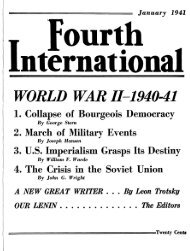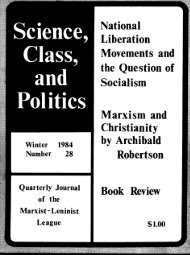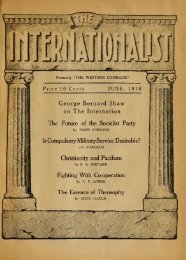The Stalin school of falsification - Marxists Internet Archive
The Stalin school of falsification - Marxists Internet Archive
The Stalin school of falsification - Marxists Internet Archive
Create successful ePaper yourself
Turn your PDF publications into a flip-book with our unique Google optimized e-Paper software.
<strong>Stalin</strong> School <strong>of</strong> Falsification -- Introduction<br />
Leon Trotsky's<br />
<strong>The</strong> <strong>Stalin</strong> School <strong>of</strong> Falsification<br />
Transcribed for the Trotsky <strong>Internet</strong> <strong>Archive</strong>, now a sub-archive <strong>of</strong> the Marxist writers' <strong>Internet</strong> <strong>Archive</strong><br />
by David Walters in 1997<br />
Introduction<br />
This Is A Book about liars and their lies. Yet it does not pursue a mere iconoclastic end. It aims to show<br />
that the history <strong>of</strong> the Russian revolution has been falsified for the purpose <strong>of</strong> falsifying the basis <strong>of</strong> the<br />
revolution itself. A return to the original basis and the ideals <strong>of</strong> the Bolsheviks in the first years <strong>of</strong> the<br />
Soviet republic requires first <strong>of</strong> all that the true picture <strong>of</strong> the revolution be restored by removing the<br />
thick encrustation <strong>of</strong> falsehoods which overlays it.<br />
<strong>The</strong> history <strong>of</strong> man's development is also a history <strong>of</strong> the men who represent its social cross-currents, or<br />
its succeeding periods. Indeed, it is sometimes easier to distinguish a segment <strong>of</strong> social development by<br />
the men who prominently represent it than by any <strong>of</strong> its other marks. For, while men do make their own<br />
history, a multitude <strong>of</strong> forces combine to produce the great man <strong>of</strong> each period and the agglomeration <strong>of</strong><br />
men not quite so great who compose the general staff. For a period <strong>of</strong> progress, history kneads its leaders<br />
out <strong>of</strong> one batch <strong>of</strong> dough; for a period <strong>of</strong> reaction, a dough <strong>of</strong> very much different ingredients is used.<br />
It is not, therefore, because the conflicts in the Soviet Union are due to a base rivalry for power <strong>of</strong><br />
individuals, but because the groups <strong>of</strong> individuals involved reflect the pr<strong>of</strong>ound economic and political<br />
changes <strong>of</strong> the last fifteen years, that the latter can be grasped in the most direct and, so to speak,<br />
personal sense by an analysis <strong>of</strong> the former. Without the physical extermination or the moral destruction<br />
<strong>of</strong> the men who won the revolution and its conquests, it would have been impossible for those who<br />
succeeded them to reduce the revolution and its achievements to the low level attained almost a score <strong>of</strong><br />
years since the Bolshevik uprising.<br />
<strong>The</strong> Bolshevik party <strong>of</strong> 1917, the one that led the revolution to victory, was the most unusual political<br />
organization in the world. Strictly centralized and intolerant <strong>of</strong> the dilution <strong>of</strong> its principles, functioning<br />
illegally under Czarism and therefore dispersed by repression to the far corners <strong>of</strong> Russia and all the<br />
other countries <strong>of</strong> the earth, it nevertheless led a much richer and more democratic inner life than do most<br />
parties today. Its vigorous internal discussions and disputes, <strong>of</strong>ten conducted by means <strong>of</strong> temporary<br />
groupings, factions and their special periodicals, were not peremptorily settled by appeals to constituted<br />
and sanctified authority, to say nothing <strong>of</strong> administrative repressions or bureaucratic measures against<br />
minority opinion. <strong>The</strong> combination <strong>of</strong> party democracy and centralization enabled the party to live and<br />
flourish even under Czarist reaction, to pass through the Revolution <strong>of</strong> 1905, the long years <strong>of</strong> reaction<br />
and World War which followed, and finally to emerge victorious in the decisive conflict <strong>of</strong> November,<br />
1917. <strong>The</strong> Bolshevik party before the Revolution <strong>of</strong> 1917 was the product <strong>of</strong> a process <strong>of</strong> selection. After<br />
the tests it went through, there was little room in it for weaklings, dilettantes, adventurers and careerists.<br />
http://www.marxists.org/archive/trotsky/works/1937-st2/sf01.htm (1 <strong>of</strong> 11) [06/06/2002 15:05:49]

















